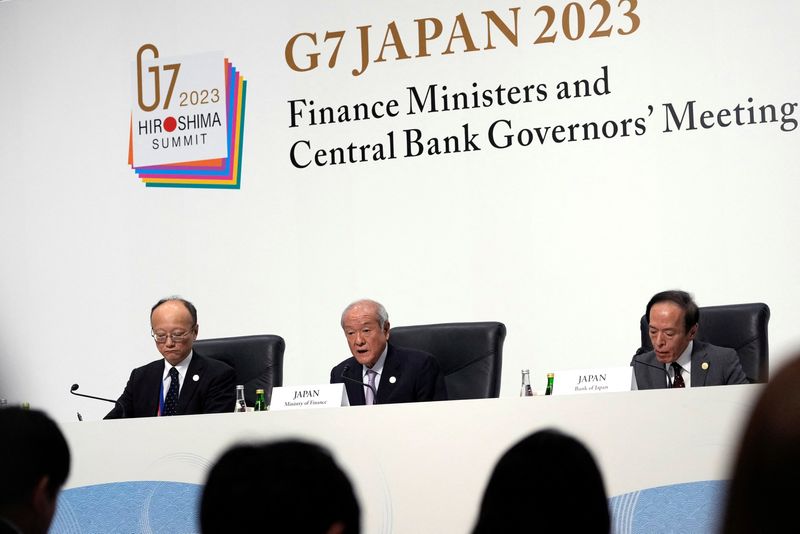By Tetsushi Kajimoto
TOKYO (Reuters) - The weekend gathering of finance chiefs from the Group of Seven (G7) advanced economies did not single out China as a threat in their communique, but left signs the world's second-largest economy will loom large at this week's summit in Hiroshima.
Efforts to grapple with China's growing global presence were evident at the three-day G7 finance chiefs' gathering in Niigata, Japan, during which they held their first outreach in 14 years, aimed at winning over emerging nations.
The meeting with Brazil, the Comoros, India, Indonesia, Singapore and South Korea primarily tackled issues such as debt and high-level infrastructure investment, in a tacit counter to China's Belt and Road initiative, analysts say.
"What's going on at the G7 is reflecting changes in global order following the loss of the U.S. dominance," said Masamichi Adachi, economist at UBS Securities. "No one is being able to draw up a grand design with shifting of power."
G7 host Japan persuaded its G7 counterparts to launch a new programme by the end of 2023 to diversify supply chains for strategically important goods away from China. The G7 comprises the United States, Britain, France, Japan, Italy, Germany and Canada.
But the finance chiefs' closing communique did not mention a U.S.-proposed idea for narrow restrictions on investment to China, a potential rift among the grouping on how far they should go in pressuring Beijing.
A Japanese finance ministry official at the gathering, who declined to be named because of he sensitivity of the matter, said the idea was discussed in Niigata, but declined to elaborate.
China is among the biggest markets for most G7 countries, particularly for export-reliant economies such as Japan and Germany. China-bound exports account for 22% of Japan's overall shipments.
Japan and the United States want to try to win over countries, including those in the Global South, with promises of foreign direct investment and aid, analysts say.
U.S. President Joe Biden last year was host of a U.S.-Africa leaders summit in Washington, aiming to bolster alliances amid the growing Chinese presence on that continent.
Japan followed suit, with Prime Minister Fumio Kishida visiting Egypt, Ghana, Kenya and Mozambique this month.
In a joint statement on Saturday, the G7 finance chiefs stressed the urgency of addressing debt vulnerabilities in low- and middle-income countries, mentioning Zambia, Ethiopia, Ghana and Sri Lanka.
They did not mention China, but said foreign investments in critical infrastructure "may pose risks for economic sovereignty," and thus must "not undermine the economic sovereignty of host countries."
Treasury Secretary Janet Yellen said in March that Beijing's lending activities left developing countries "trapped in debt," adding that Washington was working to counter China's influence in international institutions and in lending.
"There were talks about coercion" at the G7 finance leaders' meeting, the Japanese finance ministry official said.

The G7 summit will most likely have a special session on China to debate Beijing's "economic coercion" against other countries, according to a Reuters report.
"No matter how the G7 want to fence in the Global South, it's not easy," said Atsushi Takeda, chief economist at the Itochu Economic Research Institute. "These emerging economies won't side with either the West or China, while carefully weighing what will be in their best interests."